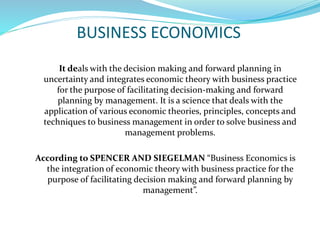Key Challenges Facing Business and Economics in the Post-Pandemic Era
Key Challenges Facing Business and Economics in the Post-Pandemic Era
Blog Article
Company and Economics 101: Important Knowledge for Striving Leaders
In today's swiftly evolving company landscape, striving leaders need to grow a thorough understanding of fundamental financial concepts and tactical frameworks. Mastering concepts such as supply and demand, market structures, and competition is not merely scholastic; these components are vital in shaping reliable decision-making and cultivating innovation. Moreover, financial literacy-- particularly in capital management-- works as a foundation for lasting growth. As we explore these necessary topics, it comes to be evident that the intersection of organization acumen and economic insight is important for future leaders to not just thrive yet make it through in their undertakings. What ramifications does this have for critical leadership?
Understanding Supply and Demand
Supply and demand are basic ideas that constantly underpin the mechanics of any type of market economic situation. The connection in between these two forces figures out the rate of products and solutions as well as their schedule out there. Supply describes the amount of a product that manufacturers are able and willing to cost different cost levels, while demand shows the quantity that customers are willing and able to acquire.
When demand boosts without a corresponding surge in supply, rates tend to rise, signaling producers to boost outcome. Conversely, if supply outstrips need, prices may fall, prompting producers to decrease result. This vibrant interaction helps to accomplish market stability, where the amount provided matches the amount required at a certain rate factor.

Exploring Market Structures
Market frameworks define the competitive atmosphere in which organizations operate, considerably affecting their pricing approaches, output degrees, and total profitability. Recognizing these structures is critical for aiming leaders, as they form organization decisions and market characteristics.
There are four key types of market frameworks: best competition, monopolistic competition, oligopoly, and monopoly. In a perfectly open market, countless firms provide the same items, bring about price-taking behavior. Monopolistic competition attributes lots of firms selling set apart items, allowing for some pricing power. Oligopolies consist of a couple of leading companies that can affect market value, commonly resulting in critical communications and competitive habits. Syndicates exist when a solitary company regulates the market, resulting in the greatest level of pricing power and potential market inadequacies.
Each market framework provides special difficulties and chances for businesses. Leaders need to comprehend these nuances to efficiently position their organizations, develop competitive strategies, and respond to market changes. By grasping the effects of numerous market structures, aspiring leaders can make enlightened choices that drive their organizations towards sustainable success and growth in an ever-evolving financial landscape.
Financial Concepts for Leaders
Reliable leadership in business demands a solid understanding of monetary principles, as they underpin tactical decision-making and source allowance. Leaders should grasp key ideas such as capital management, success evaluation, and monetary projecting. These aspects are find out here crucial in assessing a company's financial wellness and directing its future direction.
Cash money circulation management is specifically important; it guarantees that the organization preserves sufficient liquidity to fulfill its responsibilities while pursuing development opportunities. Assessing success permits leaders to recognize which solutions or items produce the highest returns, making it possible for informed financial investment choices. Furthermore, financial projecting aids prepare for future incomes and costs, helping with even more precise budgeting and resource appropriation.
Additionally, comprehending economic statements-- such as equilibrium sheets, income declarations, and capital statements-- furnishes leaders with the insights required to make informed choices. This expertise promotes liability and openness, boosting stakeholder trust.
In today's dynamic business environment, leaders should be proficient at analyzing financial data to respond quickly to market adjustments. Ultimately, a strong grasp of economic concepts empowers leaders to drive their organizations towards sustainable success while effectively handling resources and risks.
The Function of Competition
Comprehending the role of competition is vital for any type of service aiming to prosper in a saturated market. Competitors drives innovation and performance, engaging services to enhance their items and solutions consistently. In an affordable landscape, companies must differentiate themselves to bring in and preserve consumers. This distinction can show up via remarkable quality, distinct attributes, or phenomenal customer care.
Furthermore, competitors can bring about far better pricing techniques. As companies try market share, they are incentivized to offer affordable rates, benefiting customers while challenging companies to handle costs efficiently. This vibrant fosters a culture of regular improvement, pressing organizations to simplify procedures and improve worth suggestions.
In addition, competitors can promote market growth by motivating brand-new participants. New organizations frequently present fresh concepts and techniques, even more enhancing the overall market landscape. However, firms have to likewise be vigilant; extreme competitors can bring about market saturation, decreasing profitability for all gamers included.
Inevitably, understanding and browsing competitors is essential for leaders. moved here By identifying its complex duty, striving leaders can make informed decisions that position their companies for long-term success in an ever-evolving marketplace.
Strategic Decision-Making
In the world of business, strategic decision-making is basic to adjusting and achieving long-lasting objectives to changing circumstances. This process involves evaluating numerous options and picking one of the most efficient strategy that lines up with the company's vision and objectives. Effective critical decision-making needs a detailed understanding of both external and interior environments, including market trends, competitive dynamics, and business click here for info capabilities.
Leaders must collect pertinent information, evaluate it seriously, and projection potential outcomes. Furthermore, assessing risks connected with each alternative allows leaders to create and expect difficulties backup plans.
Inevitably, successful tactical decision-making encourages companies to browse intricacies, utilize possibilities, and respond proactively to threats. By growing a society that values informed decision-making, companies place themselves to innovate and keep an affordable edge in an ever-evolving service landscape. Aspiring leaders have to sharpen these abilities, as their capability to make audio strategic decisions will substantially affect their companies' success and sustainability.

Verdict
Finally, a solid grasp of service and business economics principles is necessary for striving leaders. Knowledge of supply and demand, market frameworks, and financial principles promotes informed decision-making and effective source allowance. Recognizing the duty of competitors more improves strategic reasoning, making it possible for leaders to browse complex market dynamics. Ultimately, this foundational understanding outfits future leaders to innovate and line up organizational approaches with evolving market problems, leading the way for continual success and profitability.
Comprehending these principles is critical for striving service leaders, as they develop the foundation for reliable decision-making in rates, resource allowance, and market approach. Comprehending supply and demand outfits leaders to browse the intricacies of market changes and customer actions.
Monopolies exist when a single firm regulates the market, resulting in the highest degree of rates power and possible market inefficiencies.
By comprehending the ramifications of numerous market frameworks, aspiring leaders can make enlightened decisions that drive their companies towards lasting success and development in an ever-evolving financial landscape.
Comprehending the duty of competitors more improves strategic thinking, allowing leaders to navigate complicated market characteristics.
Report this page